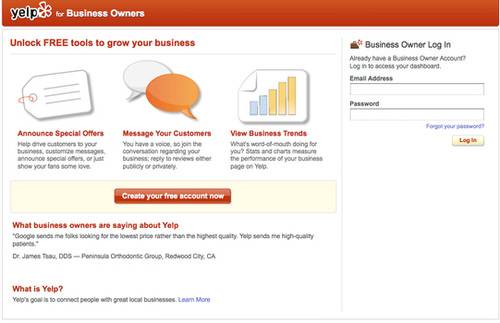It’s been a few years since Yelp launched, but despite proliferatingcompetition, the user-generated business reviews site isn’t going anywhere. For some local businesses, it’s a blessing. For others, the very public, sometimes brutal candor of their customers can be a lot to swallow.

Like it or not, social media has empowered customers to call it like they see it and businesses have no choice but to join the conversation. So how can a small, local business make the most of Yelp and its often passionate community? We talked to Luther Lowe, Yelp’s Manager of Local Business Outreach and he shared a few pointers.
Don’t Try to Influence Reviews
Let’s be honest: Business owners are used to being in control. When you bought an ad in your local newspaper (remember those?), you could work with the ad sales rep to define exactly the message you wanted the public to see. If somebody thought your service sucked, the worse they could do was gripe to a friend or tell you to your face. Now, those customers collectively have a megaphone that’s arguably even bigger than the one the local paper used to hold.
As tempting as it is, business owners shouldn’t try to directly influence the reviews of their establishment on Yelp, says Lowe.
“Yelp is different than many other review sites in that we discourage review solicitation,” he says. “There’s only one way to truly influence your reviews on Yelp: a laser focus on customer service.”
It’s Just a Negative Review. Don’t Freak Out.
Nobody likes to hear negative things said about them. Unfortunately for businesses, most people don’t tend to treat them with the same politeness as they would a person with whom they’re speaking face-to-face. And sure, when somebody publicly trashes your business, it can sting.
“No one is taking that negative review as seriously as you are,” says Lowe. “It is, after all, one person’s opinion.”
Yelp offers business the means to respond to reviews in a direct, private message or publicly on the site. Lowe recommends starting with a cool-headed, diplomatic message to the dissatisfied customer and then seeing where things go from there.
“Often, users will update their review and change it from a 2-star to a 4-star after being contacted by an apologetic-sounding business owner,” says Lowe.
If that doesn’t work, well, it’s not the end of the world.
Listen and Learn
Whether reviews are good, bad or indifferent, they’re still the opinions and anecdotes of actual customers. Never before has so much insight been made so readily available to people who run businesses. Use this feedback to learn what your strengths and weaknesses might be. Improving on those weak points can only result in more satisfied customers – and more positive reviews.
Says Lowe, “If ten people say your bread is stale, guess what: your bread is stale.”
The information to be gleaned from Yelp isn’t limited to your own reviews, says Lowe. You can also use the site to conduct a competitive analysis and learn what your local rivals are doing to enamor – or enrage – their customers. Apply those lessons to your own business and watch it thrive.

Take Advantage of Yelp’s Tools For Businesses
We mentioned a couple of tools that Yelp has made available to businesses, such as the ability to respond to reviewers. Business owners can find that and more at the site’s business portal, found at biz.yelp.com. From there, you can claim a business listing, add informative details and unlimited photos to it, and establish rewards for customers who check in to your establishment via Yelp. They also publish a weekly email newsletter containing tips and best practices for using the site.





















